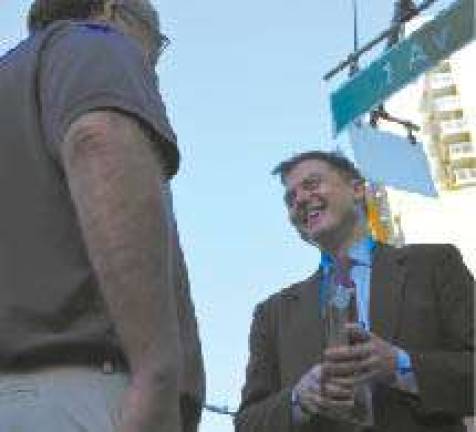Going It Alone in a One-Party Town


David Garland is running as a Republican in a GOP no man's land
upper east side "The Republican Party is dying in New York City and nobody seems to care."
So wrote Sydney Schanberg in the pages of the New York Times over 30 years ago, after watching a political debate on public access television when he noticed that not a single Republican was present.
However lean their party was in those days, Republicans in New York might remember them fondly when compared to their current condition. Right now, there's not a single Republican in the Assembly representing Manhattan, Brooklyn, Queens or the Bronx. Just two Republicans represent districts in Staten Island.
David Garland was a paperboy the year of Schanberg's piece. "That was the year Reagan was shot," he said recently, at the corner of 86th Street and 1st Avenue. Garland, a Republican, was talking to voters about his 76th Assembly District bid, which has come into sharper focus in light of Tuesday's Democratic primary vote.
A black Wilson gym bag filled with campaign literature sat at Garland's feet. Volunteers were posted at nearby intersections ("Hi, you look like a taxpayer," was a common opening line). "This is my third time around," he said, mentioning a State Senate challenge against Liz Krueger in 2012 and his City Council bid last year. "My name is known out there. I think on the Upper East Side the voters are well educated?People are more inclined to vote for a candidate rather than a specific party, and that works for me."
But in a district where Democrats outnumber Republicans three to one, why did he choose the road less traveled?
"I've always been what I call an independent Republican," said Garland, who grew up in Burlington, Vermont, and touted his socially libertarian, small government outlook. "Vermont is a very progressive state, so obviously my thinking has been shaped a little bit by that. I very much believe in the government giving people the information in order to make a decision for themselves on social issues."
Garland pointed out that Republican Joe Lhota actually won the Upper East Side handily during his mayoral gambit last year, though that was mainly due to Mayor Bill de Blasio's support of the city's 2006 solid waste management plan, which included the massively unpopular East 91stStreet marine transfer station.
That dynamic won't be as strong in Garland's Assembly bid, because you have to be against "the dump" in order to be a viable candidate on the Upper East Side, but he sees widespread Democratic support for de Blasio as one manifestation of the dangers of one-party control in the city.
"What really gets me is that every Democrat who ran last year said they're against the dump, and yet they stood next to de Blasio last year and campaigned for him," said Garland. "It's the same this year. Nobody has taken a stance against Bill de Blasio specifically ? I'm talking about [Councilman] Ben Kallos, [Congresswoman] Carolyn Maloney and [State Senator] Liz Krueger ? the [Democratic] Party is divided on this issue."
Garland, 44, attended Georgetown University for his undergraduate degree, and earned an MBA from the Wharton School of Business. He also studied and worked abroad in places like Pakistan and Tokyo before moving to the Upper East Side in 2002.
He said while he didn't consider switching parties when he moved to New York, the thought did cross his mind after his State Senate defeat in 2012 to Liz Krueger, in which he saw the "institutional support" she drew on in terms of volunteers and fundraising.
After work he campaigns during the evening rush hours, and on the weekends he hits the farmers markets and street fairs.
"I want to serve the Upper East Side, it's my home and it's been my home for a decade," said Garland. "I think there are a lot of things that could be done that aren't even on the table right now because of the Democrats' monopoly. I think lowering taxes is actually a viable option, you have a lot of people fleeing the city because of the tax rates, a lot of businesses are leaving the city."
Garland said many Democrats in the district like his ideas and have approached him with messages of support.
"As soon as people meet me and talk to me and see what I actually stand for, and get away from this image they have from what they see on television about government shutdowns - the negative stuff - and see that I have a lot of common sense ideas, they want to vote for me," he said. "Every seat in this district was held by a Republican until the early 2000s, I think Bush did a lot of damage to the Republican Party. All politics is local, and I think all politics is cyclical. I don't think everything will stay Democrat forever."
That explains why he's willing to go up against the belly of the Democratic machine in New York time and again, despite being rejected in two previous races.
"Something will shift at some point," he said, "I don't know when."
On the street corner, a man approached Garland and asked him what he thinks his chances are of winning.
"I think I'm going to win," said Garland, who's raised about $40,000 in the race so far, and hopes to raise and spend another $60,000 before the general election on Nov. 4.
"No, come on," said the man, who gave his name as Steven, and seemingly wanted a more substantive answer. "You have my vote, but I think you have to have a screw loose to run as a Republican on the East Side," said the man.
Garland took it in stride.
"Well maybe I do, but it doesn't mean that I can't effect some positive changes here," he said.